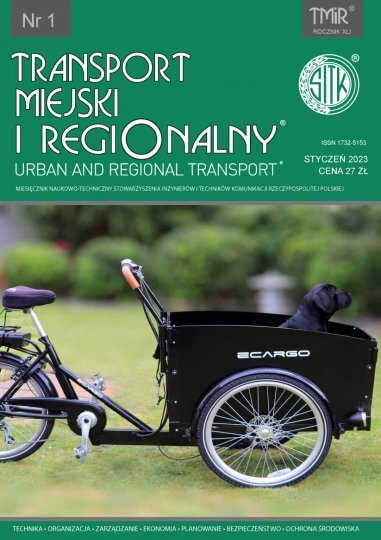 Jakub Starczewski
Jakub Starczewski
Selected issues of shaping the cargo distribution system with the use of cargo bikes inside the urban agglomeration
Abstract: The article addresses the issue of improving the efficiency of cargo delivery in historic centers of large cities and agglomerations, using cargo bicycles. It is a description of selected issues falling within the scope of the author’s doctoral dissertation. The article presents a mathematical model of the delivery system, within which the following elements have been identified: the criterion for evaluating the system’s effectiveness, the model of demand for cargo delivery, the methods of vehicle routing and the methods of selecting the location of reloading points. All elements are characterized in later parts of the text.
An approach to the evaluation of cargo delivery systems was proposed by identifying an efficiency assessment indicator that takes into account the economic dimension of the technological process and the assumptions of the sustainable development strategy. The method of calculating the individual components of the efficiency assessment indicator was formalized. The research part includes the characterization of two simulation experiments carried out using specially developed software. The first of them was carried out using the proposed method of statistical analysis of the efficiency assessment indicator and the heuristic method of the center of gravity. It concerned the determination of the location of the reloading point for the needs of the bicycle distribution system. The second, on the other hand, consisted in evaluating three routing methods (the Clarke-Wright saving algorithm, simulated annealing and the genetic algorithm) in the context of the value of the adopted efficiency assessment indicator. Its course was carried out in accordance with the plan of the full-factor experiment, taking into account the volatility of demand for freight transport. The whole was concluded with conclusions from the presented research work, and further directions of research and development of the subject were proposed.
Keywords: cargo bike, cargo distribution system, city logistics, vehicle routing, location problem
Ryszard Wróbel
The strategy of replacing the bus fleet in MPK SA in Krakow in terms of optimizing its operation time
Abstract: The operation of buses in MPK SA in Krakow is part of the company’s activity, separated in terms of subject matter, and at the same time connected by the organizational structure into one body of the enterprise. Separation of activity concerns only the execution level of the transport service and the maintenance of the technical efficiency of the rolling stock. MPK SA buses in Krakow are not the only vehicles providing transport services in Krakow. On the transport market, MPK buses must compete with vehicles of another carrier, i.e. Mobilis Sp. z o.o., which has been providing its services in Krakow since 2008. The article briefly presents the policy of replacing the bus fleet in the Company.
Keywords: urban transport, public transport, operation of the bus fleet, fleet replacement strategy
Daniel Kapica
Evaluation of passenger satisfaction with electric buses
Abstract: In the face of the requirements for ensuring an appropriate number of zero-emission vehicles operating in public collective transport systems, it is important to know the opinions of passengers about new vehicles. The aim of the article is to present the results of a survey conducted among passengers of public transport in Zielona Góra, carried out after the introduction of buses powered by electricity. The first part of the article presents the research that should be carried out among passengers and shows that comfort and ecology are features that make up the overall assessment of the quality of transport service. The following section describes the system of public collective transport in Zielona Góra operating at the time of the research. Then, questions asked by passengers and their answers were presented. Based on the answers provided, it was found that buses powered by electricity were positively received by passengers of public collective transport in Zielona Góra, mainly due to the lack of noise emissions and environmental friendliness.
Keywords: urban transport, passenger transport, public collective transport, electric bus, quality of public transport
Martyna Sydorów
Characteristics of public transport in the Gdańsk districts of Przymorze Małe and Przymorze Wielkie
Abstract: In the era of increasing motorization rate, city authorities face the challenge of creating public transport competitive to cars. At the same time, EU assumptions related to the concept of sustainable urban mobility are being implemented. These efforts are to counteract the negative effects of congestion. Public transport should be adapted to the needs of the local community and fit into the framework of broadly understood accessibility. The aim of the article is to characterize public transport in Gdańsk on the example of two districts – Przymorze Małe and Wielki, taking into account spatial and time accessibility. The study was based on an analysis of the timetables of city buses, trams and the Fast Urban Railway in the Tri-City available on the Internet. The travel time by public transport was determined based on five characteristic places for this area, which is of tourist, recreational and service importance. The base was the initial stops of the daily lines located in 10 districts of Gdańsk: Chełm, Nowy Port, Oliwa, Osowa, Stogi, Śródmieście, Ujeścisko-Łostowice, Wrzeszcz Górny, Zaspa Rozstaje and Żabianka-Jelitkowo-Wejhera-Tysiąclecia. The conducted analysis made it possible to determine the public transport connection of two residential districts of Gdańsk with natural and tourist values. As a result, general conclusions were drawn. There is a developed communication system in this area, characterized by good accessibility in terms of time and space. Thanks to this, it is possible to reach most districts of the city. Public transport in Przymorze Małe and Wielki is similarly organized as in the rest of the so-called lower terrace.
Keywords: public transport, urban transport, transport accessibility, urban mobility
Janusz Kwiatek
50 years of public transport in Dębica
Abstract: Dębica is a city located in the western part of the Podkarpackie Voivodeship, on the Wisłoka River, in the Sandomierz Basin and on the northern end of the Strzyżowskie Foothills. The Commune of Dębica is the organizer of public collective transport within its administrative borders and within the administrative borders of neighboring communes that have concluded relevant agreements with the Commune of Dębica, i.e. Dębica (rural commune), Czarna, Żyraków and Pilzno. The performance of transport as part of public collective transport is outsourced to the Operator – an internal entity of the municipality – on the basis of a long-term contract concluded with the organizer. The operator is Miejska Komunikacji Samochodowa Sp. z o. o. in Dębica. The article presents the history of the development of public transport in Dębica on the occasion of the 50th anniversary of its launch in 2022.
Keywords: public collective transport, public transport, history of public transport Translated by Google













